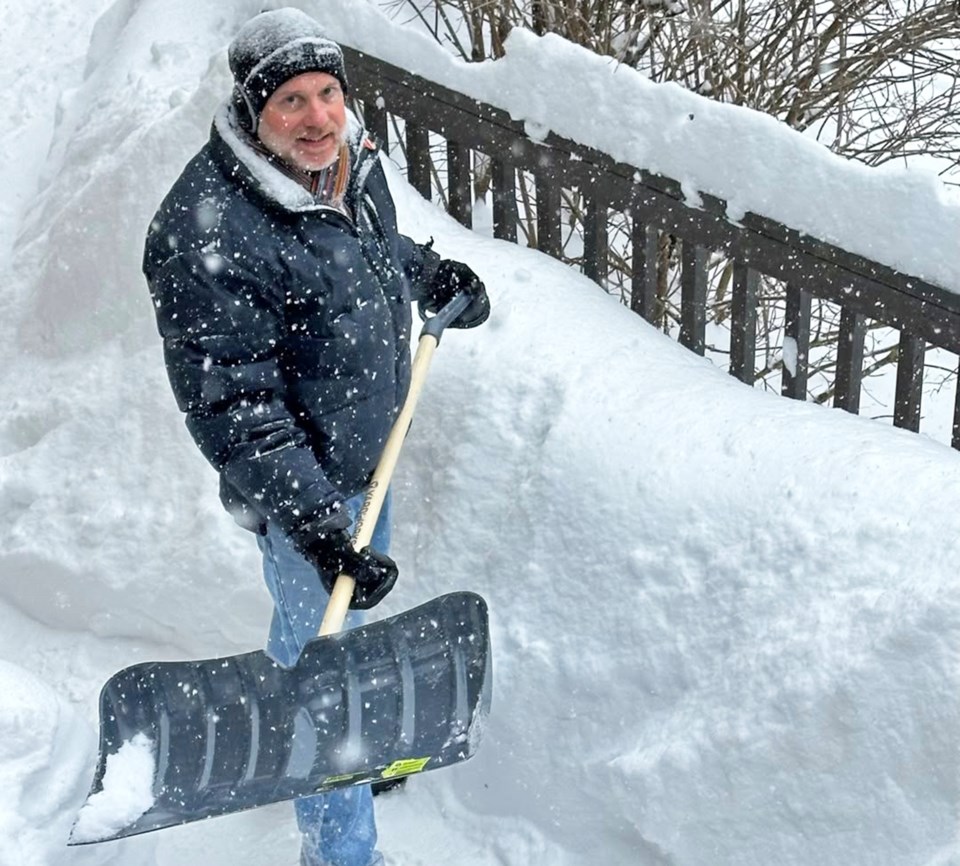A well-known Barrie doctor is offering safe snow shovelling tips after what had been a week of near-continuous snowfall that buried patios, driveways and sidewalks with heavy snow.
“Shovelling snow can be deadly to someone’s heart if it’s not healthy or fit enough to take on that level of exertion,” explains Dr. Brad Dibble, a cardiologist with PACE Cardiology on Lakeside Terrace in the city's north end.
“It’s a classic story: sudden cold-weather exertion can strain the heart enough to trigger a heart attack or cause sudden cardiac death,” he added.
“Shovelling heavy snow will lead to a significant increase in your blood pressure and heart rate. If there’s an unstable plaque in a heart artery, that strain may be enough to lead to plaque rupture and that’s what causes a heart attack," Dibble explained. "Even if it doesn’t, it can be enough extra work to cause angina, which is chest tightness because the heart isn't getting as much blood flow as it needs for the extra workload."
If you are fit and healthy, shovelling snow isn’t usually a problem if you take it slow and easy and pace yourself.
Elderly people suffering from heart disease, high blood pressure and high cholesterol are at risk if they are not careful when digging up heavy snow.
Smokers and people who live a regularly sedentary lifestyle are also a large portion of the population who need to be aware of the risks when heaving snow.
The act of shovelling causes a great deal of exertion due to the stress of the workload on your arms instead of your legs.
Dibble offers the following "heart-safe" snow shovelling advice: “Talk to your doctor before shovelling heavy snow. I would advise against it if you are older, have had a heart attack, stroke, or previous angioplasty, stents in heart arteries or heart surgery until you've been cleared for that level of exertion."
If shovelling snow is unavoidable people of all ages and fitness levels should still be careful.
“Avoid shovelling first thing in the morning, because that’s when your blood pressure tends to be at its highest and your blood is most prone to clotting,” Dibble said. "Instead, warm up your muscles before shovelling by taking a quick 20- to 30-minute walk."
Food and drink intake will also affect health and performance when trying to clear away a buried driveway.
“Don’t drink coffee, smoke or eat big meals before shovelling or during breaks,” he said. “Coffee and tobacco are stimulants and will elevate your blood pressure and heart rate. Digesting a meal will divert blood from the heart to the stomach, which isn't good when the heart needs that blood flow for exertion.”
Knowing the symptoms of a heart attack, and knowing there is urgency when getting help, is also important.
“Recognizing the signs of a heart attack and acting fast can save your life,” Lori Vajda, operations director of Simcoe Muskoka Regional Heart Program and Regional Renal Program at Royal Victoria Regional Health Centre (RVH) in Barrie, told BarrieToday.
“If you experience chest pain, shortness of breath, nausea, or discomfort in your arms, back, neck, or jaw, don’t wait — call 911 or get checked out immediately,“ she added.
Vajda stressed that at RVH, their Regional Cardiac Program is “ready 24 hours a day, seven days a week to provide lifesaving care to patients from across Simcoe-Muskoka, ensuring they receive expert treatment when every minute counts.”
The stats are sobering when you look at heart-attack response and treatment.
RVH says it is on track to implant more than 370 pacemakers, have performed 2,491 heart catheterization procedures and responded to 278 STEMIs (heart attacks with a completely blocked coronary artery) in 2024-25.
